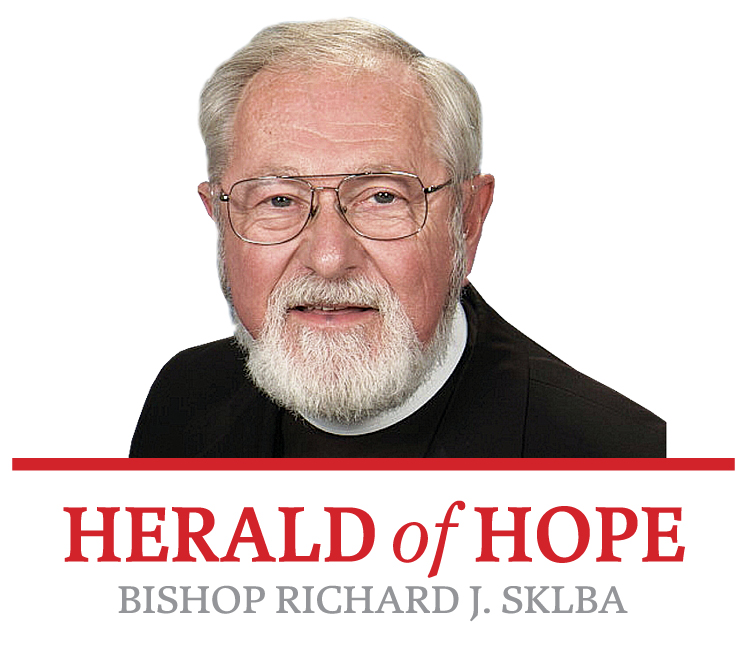Herald of Hope
In the mid 1990s, a wonderful aunt of mine (truly a delightful and colorful character in her own right) left me money in her will with the stipulation that I should travel to places I couldn’t visit otherwise. It was a marvelous gift and I began the practice each Lent of treating myself to extended annual exotic retreats at various historic locations of theological importance. The list of now 25 such pilgrimages over the years is a remarkable summary of many sites made famous by the inspired books of our Bible (and a tribute to her enduring kindness).
In 2007, for example, I spent 10 days amid the ruins of the ancient city of Philippi in Greece, staying at a small local hotel and praying each day (with St. Paul’s inspired letter in hand) amid the remnants of that great and holy place associated with his missionary journeys. To this day, the ruins, both pagan and Christian, are quite moving, including the remains of the cave where Paul himself was allegedly imprisoned (though perhaps a localized figment of later piety). In Paul’s time, however, the city was a major crossroads of commercial and military activity, situated on the main highway to the east (and in later centuries to the great metropolis of Constantinople).
All this comes to mind because we have just concluded several Sundays when the second Scripture Reading at our Sunday Eucharist has been taken from Paul’s letter to that community at Philippi, and because his primary message was a clear pastoral summons to restored unity.
His first missionary contact with Philippi (in 49 or 50 A.D., shortly after his pastoral refocus on the people of Europe) had begun with his surprise visit to a group of people engaged in some sort of Sabbath prayer under the leadership of a wealthy local cloth merchant named Lydia. (Acts 16:11-40) We are told that she and her group were baptized by Paul and that she insisted that he lodge at her home. Though his visit to that city apparently ended with a bit of social unrest and Paul’s need to leave town because of the disgruntled folks who had profited financially from a local pagan shrine, he remained very fond of that group and stayed in touch with his new converts to faith in Jesus, Lord and Savior of the world.
Sometime later, he wrote to that small Christian community because they were experiencing disagreements and divisions. Two women leaders of household churches in that city, Evodia and Syndyche by name (Philippians 4:2), were arguing about something, and Paul’s letter was an encouragement to the entire community to help them resolve their differences. He insisted repeatedly that he loved all of them (1:4.7.8) and hoped to hear that they were standing firm “in one spirit with one mind” (1:27). He quoted an ancient Christian hymn familiar to them at the time (2:6-11), which celebrated the fact that Christ had become a lowly servant only to be raised by his Father to glory, and encouraged them to likewise become servants to each other (2:3-5). We can easily recognize the text from our Good Friday liturgy, but it initially illustrated our need to serve each other’s needs as Jesus had done, not to focus exclusively on his Passion. He loved them, each and all, dearly and sought to do everything possible to assure their unity and peace. Scholars tell us that the letter as we have it today may even contain portions of several successive epistles to his beloved converts, finally united into a single work inspired by the Holy Spirit.
This great piece of Scripture, namely Paul’s letter to the Philippians, strikes me as a perfect pastoral instrument for our moment in history. Earlier this year on two occasions in this column, I reflected on the bitter divisions currently plaguing our American society. The forthcoming national elections have only served as further evidence of that spiritual sickness. As Christians, we have our own unique means of becoming a healing presence because of our common faith beneath and beyond political convictions. As Catholics, we hold fast to our global union and our sense of the sacredness of all creation. These readings from our past few Sunday celebrations of the Eucharist offer an inspired perspective on our need and our quest for restored social unity. The liturgical presence of these passages from Philippians seems a timely opportunity too precious to ignore.
I suggest that we each take a moment during this time of home-bound existence to read through Paul’s entire letter to the Philippians. Read it slowly and thoughtfully, pausing to savor any phrase or idea which might strike us at the moment. Enjoy its beauty and spiritual richness. Let it be a source for prayer, and then become ourselves yet another instrument in the healing of our society so desperately needed these days.

